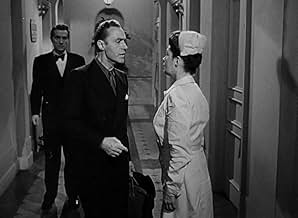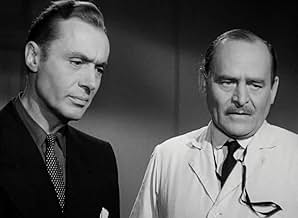París, 1938. El doctor Ravic es un médico austriaco que, huyendo del nazismo, se refugia en la capital francesa. Allí entabla amistad con Boris, que trabaja como portero de un local. Una noc... Leer todoParís, 1938. El doctor Ravic es un médico austriaco que, huyendo del nazismo, se refugia en la capital francesa. Allí entabla amistad con Boris, que trabaja como portero de un local. Una noche Ravic tropieza en la calle con una mujer, JoanParís, 1938. El doctor Ravic es un médico austriaco que, huyendo del nazismo, se refugia en la capital francesa. Allí entabla amistad con Boris, que trabaja como portero de un local. Una noche Ravic tropieza en la calle con una mujer, Joan
- Dirección
- Guión
- Reparto principal
- Premios
- 3 premios en total
- Gestapo Agent
- (sin acreditar)
- Milan Charwoman
- (sin acreditar)
- Newsboy
- (sin acreditar)
- Cashier
- (sin acreditar)
- Scheherazade's Waiter
- (sin acreditar)
Reseñas destacadas
Unfortunately while All Quiet on the Western Front stayed very much on its anti-war message, Milestone opted to make one of those tragic romances that Frank Borzage was more noted for. The problem of all the refugees from all the political turmoil up to THAT time collecting in places like Paris was left very much in the background.
Charles Boyer is one of those refugees, a Czech who can't go back to his own country because of Hitler's bloodless takeover. He's a doctor who's been serving in Loyalist Spain and got run out of there. With no passport, he's an illegal alien in France in 1939 and subject to deportation which he is by the way at one point in the film.
He meets Ingrid Bergman who's also a refugee of sorts from a series of bad relationships. He saves her from suicide and a relationship develops. In fact when Boyer is deported, she does what she has to do to survive.
Louis Calhern may have the best role in the film as Boyer's friend and counselor, an exiled Russian Lieutenant Colonel of the Czar's guard who is a doorman at a swank Russian café. Charles Laughton is in here to as an S.S. officer who Boyer remembers killing his old girl friend back in Spain and who he hunts without mercy. Laughton has one of the smallest roles he ever did in a film and I wish there were more of him here.
Laughton is seen briefly at the beginning doing the torture in his best Inspector Javert manner. Later on when Boyer spots him and makes his acquaintance to lure him for the kill, he's an avuncular tourist, but clearly on some kind of mission. He's good in both sides of the same character.
It's a real downer of a film, Arch of Triumph. Good thing we know how history turned out because it sure doesn't look good for the good guys when this film ends.
Boyer, normally a middle of the road actor, does well enough here to overshadow even the great Ingrid Bergman (they had been paired together in GASLIGHT, 1944, and she had won an Oscar for that performance). I think that happened because by this point Bergman had already met, and fallen in love with, Roberto Rosselini, and that must have distracted her no end (her character even claims to be Italian, and she speaks Italian toward the end of the film). That emotional upheaval, which was about to have serious consequences for her career, pushing her out of Hollywood for about 8 years, definitely impacted on her acting in this film, and on the latter's quality.
In the end, it is the film's dark atmosphere that stays with you - and that's not much. Still, I am glad I watched it, it is better than many supposedly politically correct movies done today.
And yet, despite my criticism, I am pleased to have seen it. As I said there's much to like, especially the acting. Louis Calhern is always a joy and here he lends a nuanced gravitas to his part. Charles Boyer is better than usual playing a tormented refugee torn between love and revenge. Charles Laughton is the pivot about which the story revolves and without him his one dimensional character would have been but a caricature. There's even a memorable cameo by an uncredited William Conrad. His scene is no more than a minute or so but it's not one you're likely to overlook or forget. But the best reason to watch it is of course Ingrid Bergman. Her effortless ability to switch personalities simply draws you in to her performance. Here she plays an insecure wreck, an incredibly seductive, infuriatingly deceitful and mostly terrified woman. Her character's choices are not perhaps entirely honorable but with Bergman who cares...
¿Sabías que...?
- CuriosidadesThe rough cut of the film ran four hours. In reducing it to two hours, several actors were cut, including Ruth Warrick. She does appear briefly in the restored 133-minute version.
- PifiasWhen Ravic takes his gun and goes to look for Haake in the streets, the first shot of him has been reversed for some reason as evidenced by the signs he passes, which are backwards.
- Citas
Joan Madou: He wanted to kill me. They always talk about it but they never do.
[laughs]
Joan Madou: You wouldn't want to kill me.
- ConexionesFeatured in Legendy mirovogo kino: Charles Boyer
- Banda sonoraLong After Tonight
(1948) (uncredited)
Music by Rudolph Polk
Music by adapted from the Russian folk song "Prochlada"
Lyrics by Ervin Drake and Jimmy Shirl
Sung by an uncredited singer dubbing Ingrid Bergman at the Scheherazade casino
Selecciones populares
- How long is Arch of Triumph?Con tecnología de Alexa
Detalles
Taquilla
- Presupuesto
- 5.000.000 US$ (estimación)
- Duración
- 2h(120 min)
- Color
- Relación de aspecto
- 1.37 : 1


























